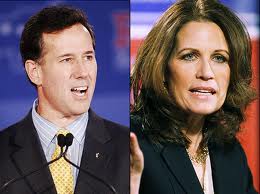African Americans Lived Better During Slavery
THE FAMILY LEADER, a group run by the failed GOP gubernatorial candidate Bob Vander Plaats, solicited GOP presidential candidates to sign a pledge supporting traditional marriage that's titled, "The Marriage Vow -- A Declaration of Dependence upon Marriage and Family."
Republican Representative Michele Bachmann of Minnesota (seen above-r), and former Pennsylvania Republican Senator Rick Santorum (seen above-l), quickly signed the pledge that calls for a ban on gay marriage and pornography.
Republican Representative Michele Bachmann of Minnesota (seen above-r), and former Pennsylvania Republican Senator Rick Santorum (seen above-l), quickly signed the pledge that calls for a ban on gay marriage and pornography.
A public uproar erupted after the "pledge" was read in which it stated that, “Slavery had a disastrous impact on African-American families, yet sadly a child born into slavery in 1860 was more likely to be raised by his mother and father in a two-parent household, than was an African-American baby born after the election of the USA's first African-American president."
After the public's disdain was evident due to these controversial words Michele Bachmann, changed her rhetoric and had her campaign spokeswoman Alice Stewart clarify that, "she signed the candidate vow" and "in no uncertain terms believes that slavery wasn't horrible and economic enslavement is also horrible."
But if Michele Bachmann and Mr. Santorum thoroughly read the pledge and still signed their name on the dotted line, then what does this say about their character?
After reading the pledge the first time obviously they didn't find it to be offensive, so what was so different about it the second time? Was it the outcry of anger from the public? Could it be they didn't read the full pledge but signed anyway? And if that's the case, do we really want a president that doesn't read what she or he signs? Do we really want a president to not consider people's feelings when endorsing products for change?
After reading the pledge the first time obviously they didn't find it to be offensive, so what was so different about it the second time? Was it the outcry of anger from the public? Could it be they didn't read the full pledge but signed anyway? And if that's the case, do we really want a president that doesn't read what she or he signs? Do we really want a president to not consider people's feelings when endorsing products for change?
Seriously, how dare they sign a pledge that degrades African Americans in such a way? How dare they even part their lips to speak about slavery as if they could or would ever know what it felt like? How dare they speak of slavery as if it were a good thing or a good time? And how dare they say that an African American child had it better off during slavery times, then right now at this very moment?
In the midst of slavery African American children were consistently sold away from their parents; African American children were raped by their slave owners and were refused an education; African American parents had no say over anything concerning their children because even though they birthed them, they didn't own their children.
So the fact that these two individuals (one who currently holds a position in Congress, and the other a former senator) can stand tall next to a pledge of blatant prejudice, speaks loud and clear to the voters of 2012.
So the fact that these two individuals (one who currently holds a position in Congress, and the other a former senator) can stand tall next to a pledge of blatant prejudice, speaks loud and clear to the voters of 2012.
And for your information Michele Bachman, Rick Santorum, and The Family Leader, slavery tore apart the lives of African Americans while forcing them into a state of poverty and economic depression which parent-less children today, are still suffering from the repercussions of the past.
For African Americans it was and still is always harder to make something out of nothing. When a person comes from a history of poverty how do you expect the future generations to turn out? When a person comes from a history of wealth how do you expect that generation to turn out?
For African Americans it was and still is always harder to make something out of nothing. When a person comes from a history of poverty how do you expect the future generations to turn out? When a person comes from a history of wealth how do you expect that generation to turn out?
America has an enormous divide between the wealthy and the poor, and it's obvious who the wealthy are and who the poor are. Can somebody say reparations?
2011 LA



Comments
Post a Comment
THANKS FOR FEEDBACK!